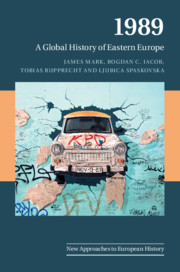Crossref Citations
This Book has been
cited by the following publications. This list is generated based on data provided by Crossref.
Marginean, Mara
2020.
Epistemic Encounters: Social Sciences and the Rethinking of Urban Planning Policies in the Early 1970s Romania.
Studia Universitatis Babes-Bolyai Sociologia,
Vol. 65,
Issue. 2,
p.
35.
Bill, Stanley
and
Stanley, Ben
2020.
Whose Poland is it to be? PiS and the struggle between monism and pluralism.
East European Politics,
Vol. 36,
Issue. 3,
p.
378.
Bekus, Nelly
and
Cowcher, Kate
2020.
Socialism, Heritage and Internationalism after 1945. The Second World and Beyond..
International Journal of Heritage Studies,
Vol. 26,
Issue. 12,
p.
1123.
Bekus, Nelly
2021.
Echo of 1989? Protest Imaginaries and Identity Dilemmas in Belarus.
Slavic Review,
Vol. 80,
Issue. 1,
p.
4.
Gryta, Janek
2021.
Regional professionals, American activists, and the Iron Curtain: transnational memory work during the Cold War in the Jewish neighbourhood of Kraków.
Canadian Slavonic Papers,
Vol. 63,
Issue. 1-2,
p.
96.
Ivančík, Matej
2021.
From Democrats to Liberals / The Ambiguous Origins of Liberals and Civil Society in Slovakia after 1989.
Soudobé dějiny,
Vol. 28,
Issue. 3,
p.
706.
Ivančík, Matej
2021.
Bridges of technocratic continuities in Czechoslovakia. From the end of Stalinism to capitalist transformation.
Soudobé dějiny,
Vol. 28,
Issue. 1,
p.
224.
Austin, Robert C.
2021.
A History of Central Europe.
p.
127.
Bădescu, Gruia
2021.
Homelands and dictators: migration, memory, and belonging between Southeastern Europe and Chile.
Journal of Contemporary European Studies,
p.
1.
Schäffler, Eva
2022.
Transformation as transnational process: German-Czech economic relations after 1989.
Journal of Contemporary Central and Eastern Europe,
Vol. 30,
Issue. 1,
p.
27.
CORDEIRO, Janaína Martins
2022.
De volta à Europa: Rememorar as revoluções de 1989 trinta anos depois, Praga e Budapeste.
Varia Historia,
Vol. 38,
Issue. 76,
p.
261.
Gagyi, Agnes
2022.
The Political Economy of Eastern Europe 30 years into the ‘Transition’.
p.
1.
Slačálek, Ondřej
2022.
The Political Economy of Eastern Europe 30 years into the ‘Transition’.
p.
251.
Babička, Martin
2022.
“The future is in your hands”: temporality and the neoliberal self in the Czech voucher privatization.
Journal of Contemporary Central and Eastern Europe,
Vol. 30,
Issue. 1,
p.
83.
Przeperski, Michał
2022.
Historiografia polskiej transformacji? Szkic do bilansu.
Kwartalnik Historii Nauki i Techniki,
Vol. 67,
Issue. 1,
p.
89.
Hamann, Raja-Léon
and
Schubert, Jan Daniel
2022.
Zwischen anti-imperialistischem Anspruch und politischer Wirklichkeit. Die Reproduktion kolonialrassistischer Strukturen in dem Amo-Forschungsprojekt der 1960er Jahre und der Statue „Freies Afrika“ in Halle a.d. Saale.
PERIPHERIE – Politik • Ökonomie • Kultur,
Vol. 42,
Issue. 1,
p.
129.
Melito, Francesco
2022.
Anti-colonial neo-traditionalism in Central-Eastern Europe: A theoretical examination.
New Perspectives,
Vol. 30,
Issue. 4,
p.
349.
Kalmar, Ivan
2023.
Race, racialisation, and the East of the European Union: an introduction.
Journal of Ethnic and Migration Studies,
Vol. 49,
Issue. 6,
p.
1465.
Narkowicz, Kasia
2023.
White enough, not white enough: racism and racialisation among Poles in the UK.
Journal of Ethnic and Migration Studies,
Vol. 49,
Issue. 6,
p.
1534.
Gross, Stephen G.
2023.
Understanding Europe's Populist Right: The State of the Field.
Contemporary European History,
Vol. 32,
Issue. 3,
p.
489.



